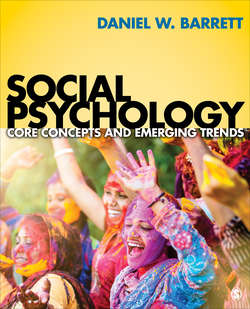Читать книгу Social Psychology - Daniel W. Barrett - Страница 96
На сайте Литреса книга снята с продажи.
Free Will
ОглавлениеResearch in social neuroscience is probably most relevant for the question of free will. In fact, a number of prominent research programs have challenged the notion that humans are in conscious control of our mental and behavioral processes (Baer, Kaufman, & Baumeister, 2008; Gazzaniga, 2011). If scientists can pinpoint the biology of nonconscious processes, and if these processes can predict social behavior without needing to factor in the conscious mind, then does it make any sense for us to talk about free will (Bargh, 2008; Baumeister, 2008)? For many social psychologists, the answer is yes: Even if we do not actually have free will, both the experience of free will and the reasons people believe in it are important for understanding social behavior (Baumeister, 2008). For example, a person who believes that he has the free will to shape his future is more likely to persist in the face of failure than is someone who thinks that he is powerless and that his fate has already been decided (Dweck, 1999).
